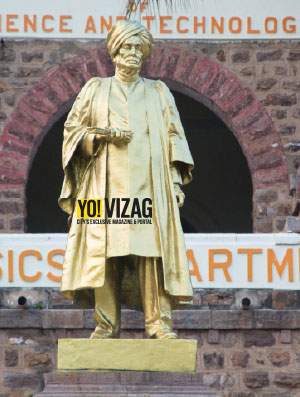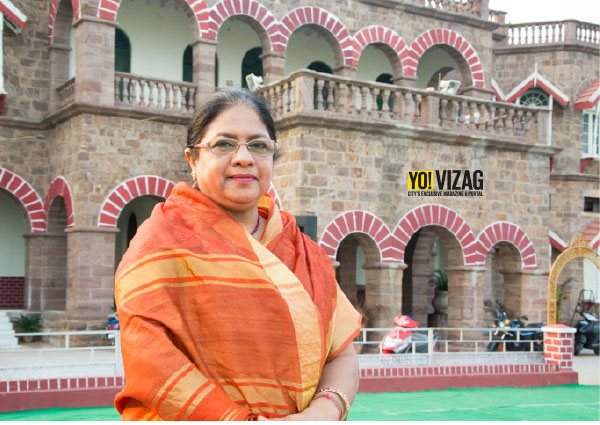Having made Vizagapatam their base, the Odiya royalty Deos contributed immensely to the fledgling city. Yo! Vizag delves into the bountiful relationship between the royal family and the city of Vizag in a conversation with Smt. Mayank Kumari Deo.
Visakhapatnam has been, indeed, home to a rich amalgam of people from different cultures, societies and languages. One such source for this colourful concoction was Odiya royalty; Kurupam, Daspalla and Jeypore royal families contributed immensely to the rich heritage that Vizag acquired over the years. The impact of Jeypore royal family’s role and involvement in shaping the city’s growth was not only phenomenal, but also pretty forward-looking. They donated generously for the cause of education, especially higher education. Andhra University used to get a princely sum of more than a lakh rupees every year during its formative decade (1930s) from Raja Vikram Deo Verma – the most noteworthy modern king (often termed the ‘saint king’, rightly so, what with his rich literary oeuvre, proficiency in and patronage of arts and philosophy becoming a part of the rich legend of modern times) of the lineage – besides getting huge tracts of land from them for constructing its campus colleges.
Hawa Mahal on the Beach-road is another telling architectural feature which had the Jeypore stamp written all-over. It started off as a transit halt for the Jeypore royalty when on the way from their kingdom Jeypore to Madras (now Chennai), the regional seat of British power, whom they owed allegiance to. Over time it gradually metamorphosed into a landmark building. At one time, the grand edifice housed elite American and British army officers of Allied powers during the Second World War, fighting the Japanese. It also served as the lodge for the first Prime Minister of independent India, Jawaharlal Nehru, when he visited Vizag to inaugurate the first ship “Jala-Usha” built by Hindustan Shipyard (the former Scindia Ship Navigation Company). Currently, Hawa Mahal is under the upkeep and possession of Maharani Mayank Kumari Deo, many cultural, artistic and recreational programmes are conducted in its precincts for the benefit of the general public, students and kids.
AU used to get a princely sum of more than a lakh rupees every year during its formative decade (1930s) from Raja Vikram Deo Verma

Traced to as far back in time as circa 1440 AD, Deos had rich lineage, a royalty ruling much of the north of the large district of Vizagapatam, now Vizag. It stretched deep into the agency area of the present day Odisha, of erstwhile Madras Presidency. The now celebrated Araku Coffee plantations once belonged to the Jeypore family until the Government took them over after the abolition of the Zamindari system. The most famous in its lineage, Maharaja Vikram Deo V, who ruled it between 1931 and 1951, was one of the greatest lovers of the city Vizag. In fact, Vizag owes a lot to Maharaja Ram Chandra Deo, the predecessor of Sri Vikram Deo, for getting Andhra University to be established in Vizag. But for his influence and financial support, AU would have been shifted to Guntur when it was decided to establish a university in the Andhra region of the then Madras Presidency. Taking that initiative forward, Sri Vikram Deo not only donated very generously for the setting up and upkeep of Andhra University, but also managed it impeccably in the capacity as Pro-Chancellor, which he conducted with both administrative acumen and pedagogical pedigree. He also used his good offices and persuaded the scholar patriot Sir Cattamanchi Ramalinga Reddy, and the most famous philosopher/statesman of his times Sri S Radhakrishnan, who, subsequently, went on to become the President of Indian Republic, to become the first and second Vice Chancellors of Andhra University respectively.
He himself was no less in terms of academic and literary accomplishments: A polyglot – he was well versed in Telugu, Oriya, Bengali, Sanskrit, Hindi & English – he had many literary accomplishments to his credit in almost all these languages. A Shat Dharma Sabha used to be organised under his auspices wherein 100 scholars were invited and competitions held. His plays and poems in Telugu entered into text-books for school children during those days. It was no wonder that he was awarded the most prestigious D. Litt. for his immense contribution in the field of language and literature. He also renovated the tribal museum at Araku which his ancestors had established before him. After his demise, his successors Maharaja Ramakrishna Deo and Shakti Vikrama Deo too had great trysts with Vizag. Sri Shakti Vikrama Deo ran the business of Mica and Calcite mining in the Borra Mica mines in Vizag agency area with headquarters at Vizag. Maharani Mayank Kumari Devi, wife of Sri Shakti Vikrama Deo is currently continuing the legacy of royalty. A graduate in English Literature and ML in International Law, she, besides practicing Law, is a curator and connoisseur of art and is fully into social service. Apart from being the past president of Rotary Club, she also is life-member of INTACH, which works for stimulating and spearheading heritage awareness and conservation in India.
The other notable contributions that Deos did to Vizag speak volumes about their spiritual mind-set, generosity and lasting legacy, be it Panduranga Temple near Beach Road or Sri Ram temple in One Town or Krishna Mutt – near Zilla Parishad Office. They were patrons of the Town Hall and also contributed to Mrs. AVN College.
The walls of the iconic Hawa Mahal on the beach road has many anecdotes secure within. For instance, the Nobel Prize winning National-poet Rabindranath Tagore’s philosophical contemplations and poetic outpourings to select gathering that included one Mr. S Radhakrishnan in it, when he came to Vizag for giving the iconic lectures “Man”, “Supreme Man” & “I am He” in Andhra University. The very same walls were also witness to the soulful rendering by the great MS Subbalakshmi.
A larger-than-life size bronze statue of Maharaja Vikram Deo, cast by the renowned sculptor, Devi Prasad Roy Chaudhury was installed in front of the College of Science and Technology, AU South Campus in 1937. If the stately gait and saintly disposition that are still so vividly evident in the majestic statue of the Maharaja creates reverence, then their Hawa Mahal on the Beach Road competes with the amazing Bay of Bengal on the other side in inspiring awe.










Discussion about this post